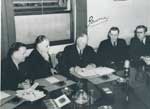PUTTING AUSTRALIA
FIRST
When John Curtin
became Prime Minister in October 1941, Japan had not yet entered the
war. Australia was yet to face its 'darkest hour'. When that time
came, John Curtin was faced with an extremely serious situation that
required a complete change in attitude towards foreign policy and
the issue of conscription. In order to ensure its defence, Australia
had to accept that Britain was unable to come to its assistance and
that we were not strong enough to defend our country on our own. This
was the moment when John Curtin decided to 'turn to America' as well
as to recall the Australian troops from overseas service and bring
in conscription for the defence of Australia.
Until recently,
most historians have interpreted this period of Curtin's life as a
renouncement of many of his earlier principles. And yet, Curtin's
arguments throughout World War I and later in the 1920s and 1930s
had always been that Australians should only be involved in war if
their own country was under attack. He consistently argued that Australia
needed to have its own
|
independent foreign policy, that it should have the resources to defend
its soil and that it should not continue to see itself as dependent
on Britain. In many ways, Curtin's approach to fighting the war was
a continuation of his earlier principles. They happened to be the
right ones for that period of time.
CURTIN WINS
OFFICE
On 7 October 1941,
Curtin took over the leadership of the country. Despite the war, there
was celebration within Labor's ranks. They finally had an opportunity
to show that they had overcome the internal problems of the party
and were fit to lead the country.
A SIGN OF INDEPENDENCE
Curtin's prime
ministership was marked by a new sense of independence from Britain.
One of the first signs of this new attitude to nationhood was Curtin's
decision to declare war on Japan independently from Britain. Until
this
moment, Australia had never declared
war on another country in its own right.
|
Another sign of this sense of Australia's own national destiny, was
the ratification of the Westminster Act in 1942 that made Australia
an independent nation. Curtin's insistence that Australian troops should
come home to defend Australia, rather than remain under British command
and his decision to invite the Americans into Australia were part of
this same shift in foreign policy.

John Curtin Prime
Ministerial Library, Records of the Curtin family, Lord Gowrie - Alexander
Gore Arkwright, Baron Gowrie, Signing Declaration of War on Japan (as
observed by cabinet), December 1941, JCPML 00376/102.
Previous
page | Next
page |

